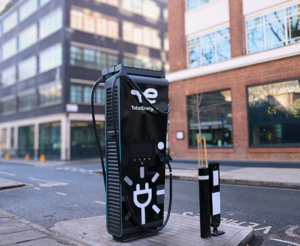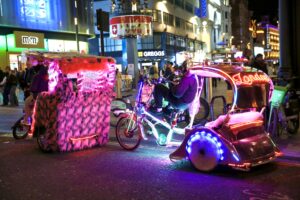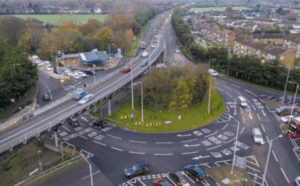Better analysis of traffic flows and their impact on air quality, using AI to improve road safety and Working with innovative start-ups and small businesses have all been achieved on London’s roads as part of a successful partnership between Transport for London (TfL) and Bosch.
The two organisations have outlined how their innovative partnership has helped improve transport in the capital, with their work including the utilisation of AI to improve road safety, new approaches to tackling Tube noise, optimising traffic signalling and greater insight of how smoothing traffic flow can improve air quality.
The pilot partnership, which began in November 2018, has seen both companies work together on several innovative projects across London.
TfL has a strong track record in world-leading innovation in transport and mobility, from the use and provision of open data, contactless ticketing, the implementation of world-leading road congestion and air quality measures and the development of advanced Tube signalling.
Building on this, TfL was keen to collaborate with a private sector innovator to help further address key transport issues within London.
Bosch’s commitment to collaboration to shape a new era of mobility that is sustainable, safe and exciting aligned well with both TfL and the Mayor of London’s plans to engage with new technologies and ideas to help solve specific challenges.
By partnering with Bosch’s dedicated Mobility Solutions team, the partnership allowed for new ways of working and innovative ideas to flourish.
Amongst several achievements made during the collaboration were:
- Better analysis of traffic flows and their impact on air quality: TfL and Bosch used data to define, implement and evaluate a new traffic signalling timing strategy to improve localised air quality in Lambeth. ‘Floating car data’ (with HERE Technologies, in collaboration with Bosch) and automatically recorded TfL traffic flow and vehicle fleet data, together with Bosch air quality monitors and modelling capabilities, gave clear evidence that enabling a smoother flow of traffic can help reduce harmful emissions across the capital
- Using AI to improve road safety: In a small-scale trial in Lambeth, artificial intelligence and digital imaging was used to help identify near-miss incidents at a pedestrian crossing. This has helped lay the foundations for potential lifesaving future work that will bring London ever closer to Vision Zero, the target of no deaths or serious injuries on London’s roads by 2041
- Working with innovative start-ups and small businesses: TfL experts spent time working with start-ups such as Travel AI, CityMaaS and Emitwise in the mobility eco system to explain London’s key challenges and encourage them to come up with problem solving ideas
- Identifying and trialling new ways to address Tube noise: The partners also explored new, pioneering ideas for addressing Tube noise and advanced braking systems for buses, which will build on the world-leading safety measures already in place to keep Londoners safe. The work on Tube noise involved research and desk based studies on how to reduce noise
The Bosch-TfL partnership was instrumental in the establishment of the ‘urban mobility lab’, which small businesses and innovative start-ups were able to use.
It was designed as a forum for innovative idea sharing, guidance and mentoring, and for working on projects, all with the common goal of using technology to drive innovation in mobility with a focus on improvements to London’s transport system.
Members also had full use of TfL’s Open Data platform, and access to bespoke datasets to help investigate particular problems.
As well as helping to address London’s transport challenges, the partnership has also helped Bosch gain valuable understanding of how a transport provider for a global megacity like London works with an eco-system of suppliers and boroughs to implement innovative technology.
Bosch’s know-how and skills, coupled with their desire to ensure all partnerships reach market maturity, has allowed TfL to model how future partnerships with leading tech companies like Bosch could look.
Rikesh Shah, Head of Commercial Innovation at TfL, said: “I am immensely proud of the work achieved in the past two years with Bosch through this co-innovation approach.
“By working together and sharing ideas, knowledge and data, we have moved forward to achieve things that a few short years ago we would have deemed impossible. We went into this with open mind on what trials can achieve and it is by using this innovative way of working can learn why some things didn’t work out quite as planned, and move forward to with better understanding in the future.
“The smart technology available that we can use to better London’s transport network will make it possible for us to bring new solutions to our transport network, making it a better city for us all.”
Arun Srinivasan, head of Bosch Mobility Solutions in UK, said: “We are delighted to have had the privilege of working with TfL – a very forward-looking transport authority shaping the future of mobility in London, Europe’s only megacity.
“Open knowledge sharing underpinned by TfL’s expertise and data has helped us both develop innovative approaches to technology driven solutions and partnerships. TfL’s in-depth knowledge of how the city works and what it takes to keep London moving has been instrumental to the results of our innovation partnership.”
The lessons learned from the pilot innovation collaboration partnership with Bosch will inform the design of any future innovation collaboration partnerships, alongside the insights from the Expression of Interest TfL recently issued to the market.
























